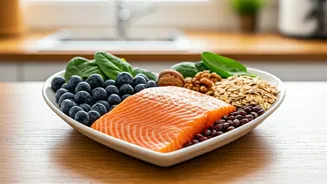Embracing Heart Health
Heart-friendly foods are essential for maintaining cardiovascular health. By including specific items in your daily diet, you can support your heart's
well-being. This can be done by understanding how the foods you consume can impact your health, which helps to make more informed choices. The discussion will emphasize six important foods. These foods can offer a range of benefits, from reducing inflammation to improving cholesterol levels. Making these foods a regular part of your diet is a key step towards better health. This journey involves mindful eating and making choices that contribute positively to your heart's health.
Oats: Fueling Your Heart
Oats are well-regarded for their ability to lower cholesterol, making them an excellent choice for heart health. They contain soluble fiber, which traps cholesterol in the digestive system and prevents its absorption into the bloodstream. Including oats in your diet can contribute to reduced LDL (bad) cholesterol levels. Oats can be prepared in various ways: as oatmeal for breakfast, added to smoothies, or used in baking. Their versatility makes them an easy and delicious way to support heart health. Regularly consuming oats helps stabilize blood sugar levels, and provides sustained energy. This is useful for individuals at risk of heart disease.
Salmon: Fatty & Friendly
Salmon is rich in omega-3 fatty acids, which are vital for heart health. Omega-3s help reduce inflammation, lower triglycerides, and improve overall cardiovascular function. Regular consumption of salmon can lower blood pressure and reduce the risk of arrhythmias (irregular heartbeats). Besides these benefits, salmon is also a great source of protein and essential nutrients. It can be grilled, baked, or pan-fried, offering versatility in preparation. Salmon supports a healthy heart and provides the body with the building blocks it needs. This should be a regular feature in your diet to maximize its benefits.
Berries: Nature's Boost
Berries, such as blueberries, strawberries, and raspberries, are packed with antioxidants. These compounds combat oxidative stress and protect the heart from damage. The antioxidants in berries, including anthocyanins, help improve blood vessel function and reduce inflammation. Berries are not just delicious; they provide a natural sweetness without added sugars. They can be enjoyed as a snack, added to breakfast, or included in desserts. Adding berries to your diet provides a significant boost to your overall health and supports cardiovascular well-being. Berries contribute to reducing the risk of heart disease.
Leafy Greens: Powerhouse Greens
Leafy greens, like spinach, kale, and collard greens, are rich in vitamins, minerals, and fiber. They provide essential nutrients, including vitamin K, which is important for blood clotting and healthy arteries. These greens help to reduce inflammation and support overall cardiovascular function. Leafy greens are incredibly versatile and can be added to salads, smoothies, or cooked dishes. They offer a wealth of nutrients with very few calories. Incorporating leafy greens into your daily meals is a simple but effective way to promote heart health and protect against cardiovascular diseases. They are a valuable addition to any balanced diet.
Nuts: Heart-Healthy Crunch
Nuts, especially almonds, walnuts, and pecans, are beneficial for heart health. They contain healthy fats, fiber, and nutrients like magnesium, which can help lower blood pressure. Regular consumption of nuts has been linked to lower levels of LDL (bad) cholesterol and reduced risk of heart disease. Nuts are a convenient and satisfying snack. They can be added to salads, cereals, or enjoyed on their own. However, it's important to consume nuts in moderation due to their calorie density. Choosing a handful of nuts each day can be a great way to promote heart health. Nuts provide healthy fats and nutrients that support cardiovascular function.
Olive Oil: Culinary Essential
Olive oil, a staple in the Mediterranean diet, is another heart-healthy food. It is rich in monounsaturated fats, which can help lower LDL cholesterol levels and reduce the risk of heart disease. Olive oil also contains antioxidants and anti-inflammatory compounds. Using olive oil in cooking, drizzling it over salads, or as a dip provides essential benefits for your heart. Extra virgin olive oil is particularly beneficial due to its higher antioxidant content. This oil enhances the flavor and health of your meals. Making olive oil part of your diet is a simple change that can have a positive impact on your cardiovascular health.












